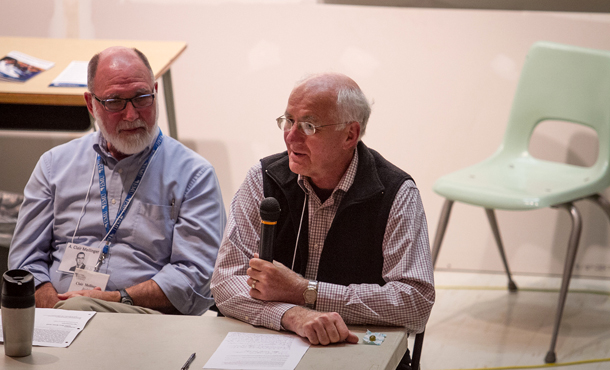A hammer banged away on the $7 million renovation project of Suter Science Center as six retired professors talked about their careers in the 46-year-old Eastern Mennonite University building. They gathered in the iconic 256-seat tiered SC-106 classroom on Oct. 11 as part of the 2014-15 Suter Science Seminar series.
“A classroom this size is now a rarity at EMU,” observed Galen Lehman, who was a student in SC-106 when it was brand-new and who studied under each of the professors on the panel. “Smaller classes are the norm now.” Lehman, who chaired the psychology department that moved to the science center in 1981, retired earlier this year. He earned his PhD in applied experimental psychology at Virginia Tech University.
Most of the professors on the panel arrived at EMU, fresh out of graduate school, around the time the state-of-the-art building, with its domed planetarium, opened in 1968. All six were EMU alumni. The science center had not yet been named for Daniel Suter, longtime biology professor and pre-med advisor who retired in 1985 and died in 2006.
“The highlight of my career was working with all these people,” said Joe Mast, looking fondly at the row of colleagues to his right. “We formed quite a community.”
The six professors were a good fit for a small college, where they had to teach a variety of courses. But they were also a product of a college where they were encouraged to delve into a variety of subjects. Many of them were on faculty teams that taught “IDS” (interdisciplinary studies) courses that were required of all students in the 1970s.
Clair Mellinger, who earned his PhD in plant ecology from the University of North Carolina-Chapel Hill, taught almost every science-related course, at one time or another, that didn’t have “human anatomy” or “physiology” in its title. “I even taught a nutrition course,” he said. Over the years he became an expert on ornithology, the study of birds. For 25 years he was the curator of the Hostetter Museum of Natural History in the science center.
Kenton Brubaker, with a PhD in horticulture from Ohio State University, branched out to biology, biochemistry, genetics, ecology and agriculture. “I taught a course on cell biology, which was new to me but very exciting,” he said. “Years later I saw a former student who got a PhD in cell biology from Harvard. He said my course started his quest in the field.”
“None of my nutrition students got a Harvard PhD in nutrition,” retorted Mellinger.
One of Brubaker’s primary interests was international agriculture, fostered by a three-year teaching term in the Democratic Republic of the Congo in the 1960s with Mennonite Central Committee. Another interest that he pursued, beginning in the early 1970s, was environmental studies and conservation. He and Mellinger helped start a campus organization called Earthkeepers that continues to this day.
Brubaker, the oldest of the retiree group, joined the EMU faculty in 1959. The others came during the 1960s and early 1970s.
The Suter Science panel discussion, coinciding with the 2014 Homecoming and Family Weekend, attracted alumni who had studied in the building and sat in the professors’ classes.
Millard Showalter, who earned an EdD from the University of Virginia, taught in the mathematical sciences department. He followed five simple teaching principles: be enthusiastic, use humor, always be prepared for class, use praise, and demonstrate a sincere interest in each student.
In his “Math and the Liberal Arts” course, he had a standing invitation for students to earn an automatic “A” by showing how they could take a plain sheet of paper and fold it eight times. For years, no one met the challenge. Showalter felt it was not humanly possible to fold a paper that many times. Finally, a student showed up one day with a tiny lump of paper that he had folded eight times. The student was – and Showalter looked to his left on the panel – Lehman, who worked part-time at a machine shop and used a mechanized press to aid him.
Glenn Kauffman, with a PhD in physical organic chemistry from the University of Pennsylvania, marveled at the equipment improvements in his department over the years. “It’s amazing that we never had a major fire in the chemistry labs in the early years,” he said. “And the organic chemistry lab used to be the smelliest place in the building.”
Kauffman is most proud of “developing a culture of research” among his students. He devoted much of his own time – in addition to a full teaching load – to conducting research with students. Sometimes the research was in collaboration with James Madison University, across town, with grants from the National Science Foundation.
Joseph Mast juggled his interests in math, physics, astronomy and computer science. His PhD from the University of Virginia was in astronomy, but he was also trained in the other areas. He was an early student and then early instructor in computers. For 20 years he was director of EMU’s M.T. Brackbill Planetarium, enjoying his interaction with school children who came to his planetarium shows.
“My favorite course was astronomy,” he said. “When students would excitedly find Orion in the sky – that was great.”

What a great team of faculty! Thanks Steve for the great article and interesting comments.